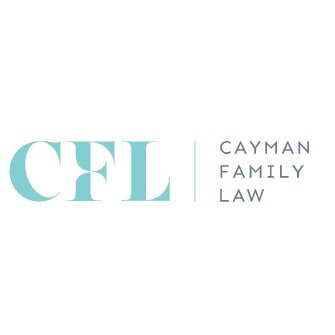Best Military Divorce Lawyers in Cayman Islands
Share your needs with us, get contacted by law firms.
Free. Takes 2 min.
Free Guide to Hiring a Family Lawyer
Or refine your search by selecting a city:
List of the best lawyers in Cayman Islands
About Military Divorce Law in Cayman Islands:
Military divorce in the Cayman Islands follows specific legal procedures that can differ from civilian divorces. It involves unique considerations, such as the division of military pensions and benefits. It's essential to work with a lawyer familiar with military divorce laws to ensure your rights are protected throughout the process.
Why You May Need a Lawyer:
You may need a lawyer for military divorce in the Cayman Islands if you and your spouse are in the military, have complex assets to divide, or if there are disputes over custody or support. A lawyer can help navigate the legal system, ensure your rights are protected, and provide guidance on the best course of action for your specific circumstances.
Local Laws Overview:
In the Cayman Islands, military divorce follows the Matrimonial Causes Law, which governs all aspects of divorce, including asset division, custody agreements, and support payments. Military pensions and benefits are considered marital property and may be subject to division in a divorce settlement. It's important to understand these laws and seek legal advice to protect your interests.
Frequently Asked Questions:
1. Can I file for military divorce in the Cayman Islands if one or both of us are stationed overseas?
Yes, military divorce can be filed in the Cayman Islands even if one or both parties are stationed overseas. It's essential to work with a lawyer who is familiar with international divorce laws to ensure the process goes smoothly.
2. How are military pensions divided in a divorce in the Cayman Islands?
Military pensions are considered marital property in the Cayman Islands and may be subject to division in a divorce settlement. The court will consider various factors, such as the length of the marriage and each spouse's contributions, when determining how to divide the pension.
3. What factors are considered when determining child custody in a military divorce?
When determining child custody in a military divorce, the court will consider the best interests of the child. Factors such as stability, living arrangements, and each parent's ability to care for the child will be taken into account.
4. How long does a military divorce in the Cayman Islands typically take?
The length of a military divorce in the Cayman Islands can vary depending on the complexity of the case and whether there are any disputes that need to be resolved. On average, a military divorce can take several months to a year to finalize.
5. Do I need my spouse's consent to file for military divorce in the Cayman Islands?
No, you do not need your spouse's consent to file for military divorce in the Cayman Islands. However, you will need to serve your spouse with the divorce papers and follow the legal procedures outlined in the Matrimonial Causes Law.
6. Can I receive military benefits after a divorce in the Cayman Islands?
Whether you can receive military benefits after a divorce in the Cayman Islands will depend on the terms of your divorce settlement. It's essential to work with a lawyer to ensure that all relevant benefits are addressed in the agreement.
7. What happens if my spouse is deployed during the divorce process?
If your spouse is deployed during the divorce process, it can complicate matters, but the divorce can still proceed. It's important to communicate with your lawyer and the court to make arrangements for serving legal documents and attending court hearings while your spouse is away.
8. Can I modify a military divorce settlement in the Cayman Islands?
It is possible to modify a military divorce settlement in the Cayman Islands, but there are specific criteria that must be met. Changes in circumstances, such as a significant change in income or custody arrangements, may warrant a modification of the settlement.
9. What happens to military housing in a divorce in the Cayman Islands?
Military housing in a divorce in the Cayman Islands will depend on whether the housing is considered marital property and how it is addressed in the divorce settlement. It's essential to work with a lawyer to determine the best course of action for your specific situation.
10. How can I protect my rights in a military divorce in the Cayman Islands?
To protect your rights in a military divorce in the Cayman Islands, it's crucial to work with a lawyer who is knowledgeable about military divorce laws. Your lawyer can ensure that your interests are represented throughout the process and help you navigate any legal challenges that may arise.
Additional Resources:
If you need legal assistance with a military divorce in the Cayman Islands, you can contact the Cayman Islands Legal Department or the Cayman Islands Law Society for referrals to experienced lawyers who specialize in military divorce cases. These resources can help you find the right legal representation for your unique situation.
Next Steps:
If you are considering a military divorce in the Cayman Islands or need legal advice on the process, it's essential to consult with a lawyer who is experienced in military divorce law. A lawyer can guide you through the legal procedures, protect your rights, and help you achieve a fair outcome in your divorce settlement. Contact a local legal professional today to discuss your options and get the support you need during this challenging time.
Lawzana helps you find the best lawyers and law firms in Cayman Islands through a curated and pre-screened list of qualified legal professionals. Our platform offers rankings and detailed profiles of attorneys and law firms, allowing you to compare based on practice areas, including Military Divorce, experience, and client feedback.
Each profile includes a description of the firm's areas of practice, client reviews, team members and partners, year of establishment, spoken languages, office locations, contact information, social media presence, and any published articles or resources. Most firms on our platform speak English and are experienced in both local and international legal matters.
Get a quote from top-rated law firms in Cayman Islands — quickly, securely, and without unnecessary hassle.
Disclaimer:
The information provided on this page is for general informational purposes only and does not constitute legal advice. While we strive to ensure the accuracy and relevance of the content, legal information may change over time, and interpretations of the law can vary. You should always consult with a qualified legal professional for advice specific to your situation.
We disclaim all liability for actions taken or not taken based on the content of this page. If you believe any information is incorrect or outdated, please contact us, and we will review and update it where appropriate.
Browse military divorce law firms by city in Cayman Islands
Refine your search by selecting a city.












